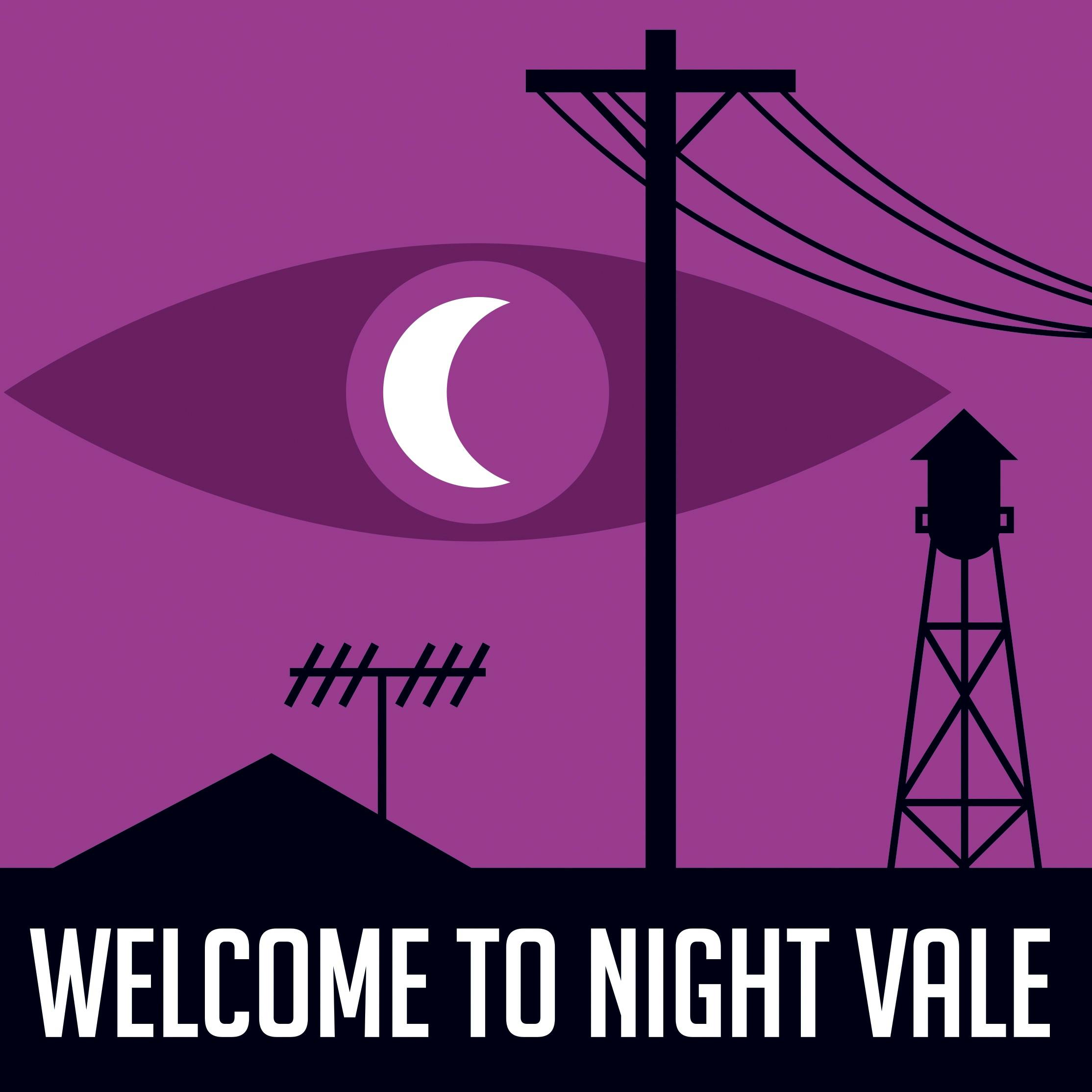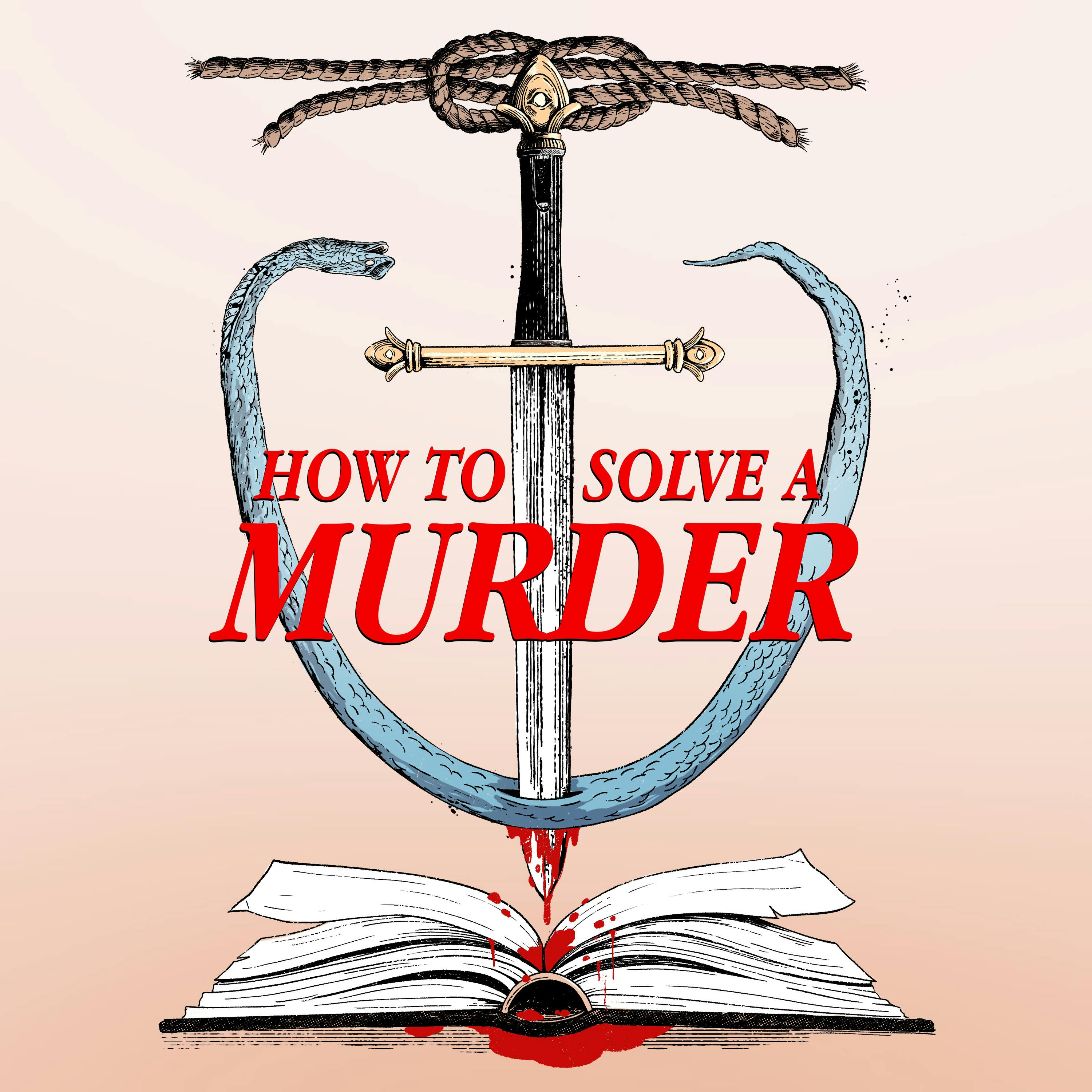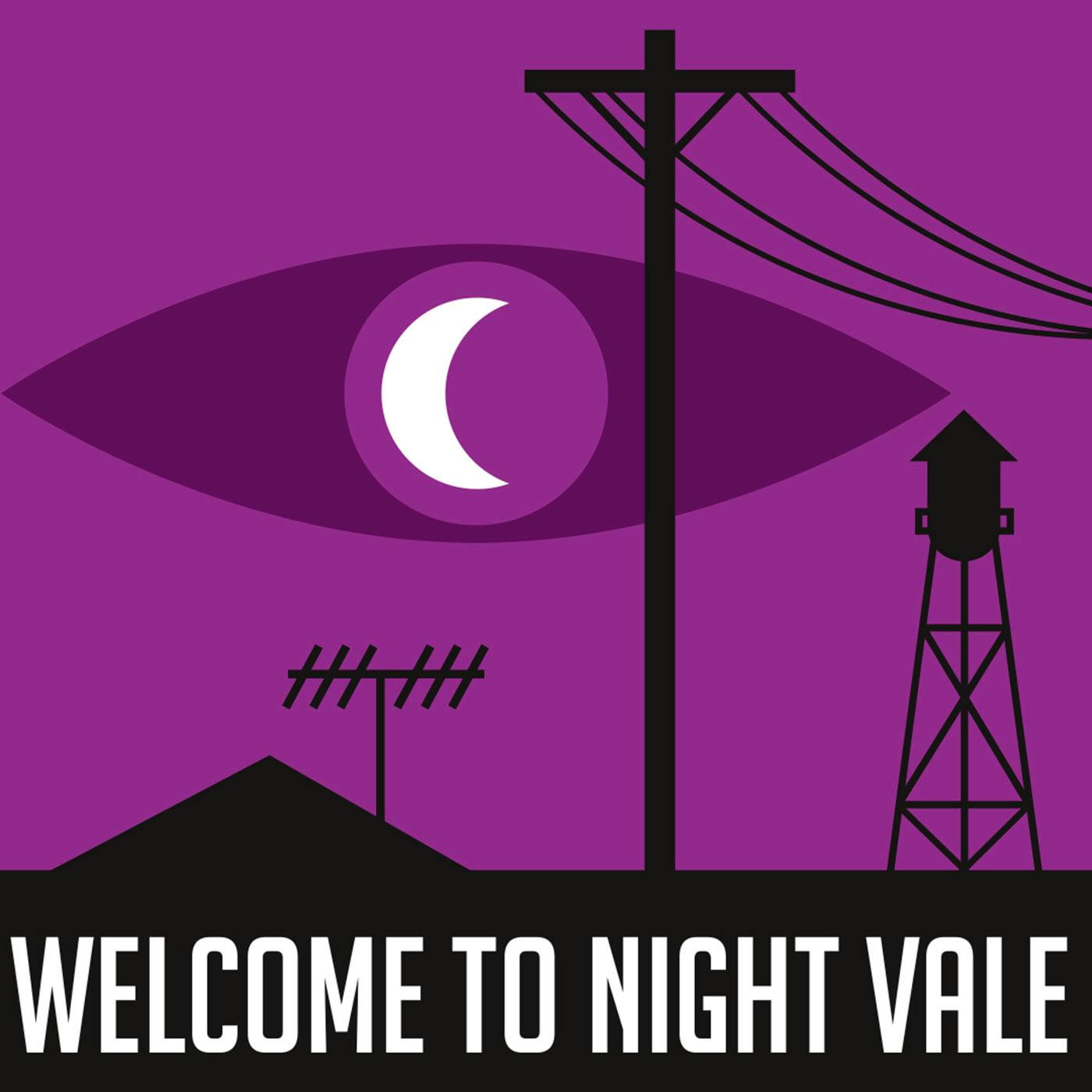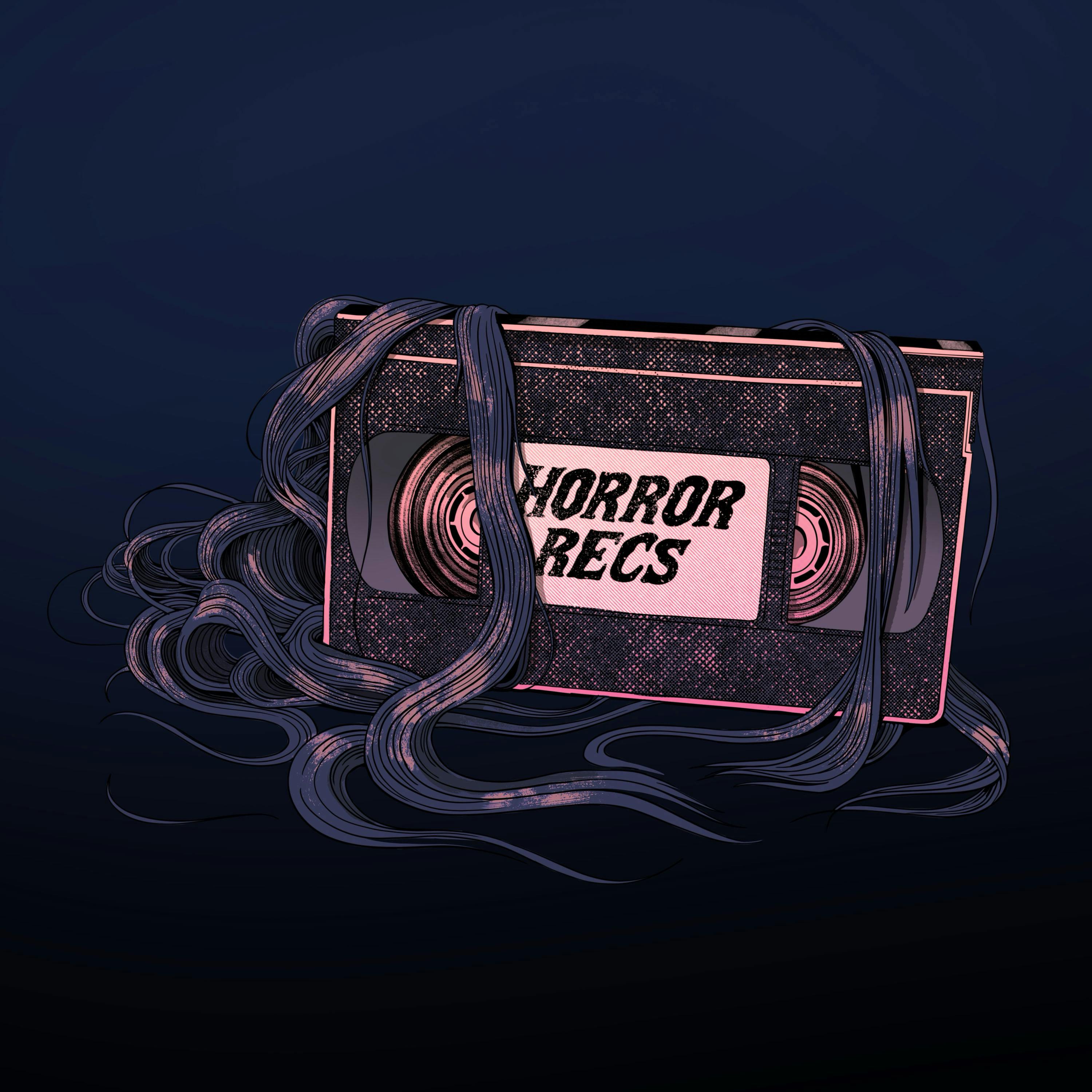162 - Alpha
Weather: “Skinchanger” by Skeptic
skepticdeath.bandcamp.com
Just announced: our 13-city book tour for The Faceless Old Woman Who Secretly Lives in Your Home! Come see Joseph and Jeffrey out on the road this spring. Plus, we’re sending out exclusive patches and an art print to folks who pre-order the novel! Check out all of the details on our website:
http://www.welcometonightvale.com/books/
Our 2020 World Tour has a name: “The Haunting of Night Vale.” Our host, Cecil, and his beautiful scientist husband Carlos are building a new house for themselves, but strange occurrences and ghostly encounters are plaguing the construction process. It's probably nothing. After all, how could a house be haunted before it's even done being built? Get your tickets today:
http://welcometonightvale.com/live
Music: Disparition
http://disparition.info
Logo: Rob Wilson
http://robwilsonwork.com
Written by Joseph Fink & Jeffrey Cranor. Narrated by Cecil Baldwin.
http://welcometonightvale.com
Follow us on Twitter, Facebook, or Instagram.
Check out our books, live shows, store, membership program, and official recap show.
Produced by Night Vale Presents.
http://nightvalepresents.com
Learn more about your ad choices. Visit megaphone.fm/adchoices
Press play and read along
Transcript
Speaker 1 Hey, y'all, it is Jeffrey Kraner speaking to you from the year 2025. And did you know that Welcome to Night Vale is back out on tour? We are.
Speaker 1 We're going to be up in the northeast in the Boston, New York City area, going all the way over to the upper Midwest in Minnesota. That's in July.
Speaker 1 You kind of draw a line through there and you'll kind of see the towns we'll be hitting. We'll also be doing Philly down to Florida in September.
Speaker 1 And we'll be going from Austin all the way up through the middle of the country into Toronto, Canada in October.
Speaker 1 And then we'll be doing the West Coast plus the Southwest plus Colorado in January of 2026. You can find all of the show dates at welcome to nightvale.com/slash live.
Speaker 1 Listen, this brand new live show is so much fun.
Speaker 1 It is called Murder Night in Blood Forest, and it stars Cecil Baldwin, of course, Symphony Sanders, me, and live original music by Disparition, and who knows what other special guests may come along for the ride.
Speaker 1 These tours are always so much fun, and they are for you, the Die Hard fan, and you, the Night Vale new kid alike.
Speaker 1 So, feel comfortable bringing your family, your partner, your co-workers, your cat, whatever. They don't got to know what a night veil is to like the show.
Speaker 1 Tickets to all of these live shows are on sale now at welcometonightvelle.com/slash live. Don't let time slip away and miss us when we are in your town because otherwise we will all be sad.
Speaker 1 Get your tickets to our live US plus Toronto tours right now at welcome to nightvelle.com slash live. And hey, see you soon.
Speaker 2 Absence makes the heart grow fonder,
Speaker 2 fear makes the heart grow louder, and death makes the heart grow flowers.
Speaker 2 Welcome to Night Vale.
Speaker 2 Amelia Anna Alfaro was always the best at everything.
Speaker 2 On the day she was born, she was named the healthiest baby at Nightvale General Hospital. The doctors had never seen a healthier baby.
Speaker 2 What a healthy baby, they said from behind a bulletproof two-way mirror as they operated the robotic arms that carefully held the infant aloft.
Speaker 2 The doctors high-fived each other, missing slightly. The trick, by the way, is to keep your eye on the other person's elbow, that or glue high-powered magnets to each person's hand.
Speaker 2 And all of the nurses cheered from dozens of feet down the hallway where they were playing with the standard tarot deck common in most neonatal units. This cheering was unrelated to Amelia's birth.
Speaker 2
The nurses had drawn the Ten of Swords, which is everyone's favorite card. It features a relaxed man receiving acupuncture by a river.
Amelia learned to walk at four months and to talk at six months.
Speaker 2 She read Plato's Republic for the first time at age four. She taught herself German and began to write sonnets in that language at age seven.
Speaker 2 At age 10, she won her first engineering competition after designing a a concrete canoe that could float, even on the most turbulent water.
Speaker 2 There is no body of water in Nightvale, so she had to prove her work using a software she wrote that generated three-dimensional models to corroborate her advanced mechanical physics formulas.
Speaker 2 She even won the state spelling bee, five years in a row, from ages 9 to 13.
Speaker 2 Her streak was only broken when the spelling bee was cancelled after the sponsors lost their dictionary.
Speaker 2 Amelia was always the best, and her mother knew it.
Speaker 2 Her mother was proud of her daughter, or rather, her mother was proud of herself for producing such a daughter, or rather, she was proud of both in a way that was difficult for her to untangle.
Speaker 2 Amelia's mother was named Yvette.
Speaker 2
Yvette could not afford much for her daughter. She worked long hours to earn the respect of her bosses, which garnered her promotions and larger paychecks.
But Yvette had hit the glass ceiling.
Speaker 2 She did not want this limitation for her daughter. Her daughter would need to be smarter, more talented, and more driven than she.
Speaker 2 Yvette wanted Amelia's value to the world to be so great that no one could deny her success.
Speaker 2 Yvette recognized Amelia's specialness and pushed hard to make her even more special, signing Amelia up for athletics and adult learning classes and piano lessons.
Speaker 2 Amelia sometimes pushed against this.
Speaker 2 Mother, I don't want to, was met with, but you will, Amelia.
Speaker 2 Why? was met with because I said so.
Speaker 2 I hate you for this was met with, you will love me for it later.
Speaker 2 Begrudgingly, Amelia fulfilled her mother's wishes.
Speaker 2 It wasn't because she understood her mother's motivation to secure her child a better life, nor was it because Amelia did not have the stomach to fight back.
Speaker 2 No, Amelia did it because it all came so easy.
Speaker 2 She was a black belt, a sharpshooter, an academic decathlon champion. She wrote her first novel at age 12.
Speaker 2 It was called A Golden Age for Parachuting, in which an all-Jewish female parachute team wins Olympic gold in 1936 Berlin in front of Adolf Hitler.
Speaker 2
In the publisher's rejection letter, the editor said the novel was, quote, immaculately written. However, parachuting stories are out of vogue.
Do you have anything about magical baseball players?
Speaker 2 Amelia did. It was a novel called One Last Swing for the Tuesday Boys.
Speaker 2 But she had written it in German and did not have time to translate the Dienstockjungen manuscript because she was currently taking a course on bird husbandry.
Speaker 2 Yvette enrolled the teenage Amelia in night classes at the community college, where she took English 113, Sonnets Are for Lovers, Structural Engineering 212, Buttress is a funny word, and Meteorology 301.
Speaker 2 Clouds, y'all. Am I right?
Speaker 2
She earned all A's and scores of college credits long before she even graduated high school. None of these challenges were difficult for Amelia.
She was the best at everything.
Speaker 2 But
Speaker 2 her life was not perfect
Speaker 2 because of the voices.
Speaker 2 It was the voices that made life hard for Amelia.
Speaker 2 From birth, she heard the constant chatter of dozens of people.
Speaker 2
None of the voices spoke directly to Amelia. They just talked and talked about their lives.
And Amelia was afraid of the voices and what the voices might imply about
Speaker 2 herself.
Speaker 2 She found solace in puzzles. Crosswords, nonograms, acrostics, cryptics, pseudocu, which I think is the one where you have to catch a a bunch of marbles with a lever-operated hippopotamus?
Speaker 2 Her mother hated Amelia's puzzle vice. If she caught Amelia doing puzzles, Yvette would make Amelia go practice archery, or write poetry, or at least listen to classical music.
Speaker 2 Amelia's favorite was Van Clyburn's masterful 1961 record of Rachmaninoff's Piano Concerto No. 13,
Speaker 2 Knuckles on the Black Keys.
Speaker 2 When she was thinking through the solution of a puzzle, the voices did not speak to her. All
Speaker 2 was
Speaker 2 silent.
Speaker 2 It was her only time of peace. It was the only time her body could rest and curl up comfortably into her own thoughts.
Speaker 2 Anything that took her away from her logic problems, including music, no matter how soothing, invited the voices back into Amelia's thoughts.
Speaker 2 Amelia was accepted to several top colleges across the country, including MIT, Stanford, Rice, and the University of What It Is.
Speaker 2
But she wanted to stay near her hometown and her family, so she went to state. Hey, that's where my brother-in-law went.
Go state!
Speaker 2 She was elected the youngest president of the student body ever at age 17 and graduated valedictorian two years later. Her friends, her professors, her mother all knew the world was Amelia's.
Speaker 2 She could become poet laureate or a senator or a Supreme Court justice or a quantum physicist, but she became none of those.
Speaker 2 This is not to say Amelia was not successful or that she amounted to nothing. It is to say the semantics of success were her own
Speaker 2
and no one else's. Amelia became an air traffic controller.
The voices never told Amelia to become an air traffic controller. They were never that specific.
The voices did not tell her to do anything.
Speaker 2 They simply talked about first dates, about apartment hunting, about their grandmother's improved health, about a bad movie they sort of loved. None of the voices talked directly to her.
Speaker 2 It was simply as though she overheard conversations from lives lived somewhere else. Other people and their quotidian hopes and worries and interests.
Speaker 2 She tried seeing therapists and psychiatrists. She tried medication to stop the voices, but nothing worked.
Speaker 2 Eventually, she decided they were not harmful voices and that she was not dealing with schizophrenia. She simply heard people talking, at all hours, about all things, having nothing to do with her.
Speaker 2 And they never told her to become an air traffic controller. Amelia chose her own career, her own path.
Speaker 2 Others thought the reason was that it was the first job opportunity to present itself, or Maybe it was her admiration of aircraft,
Speaker 2 maybe a moral sense of serving humanity through public safety and comfort. In fact, it was none of these reasons.
Speaker 2 But it should not be surprising to know that Amelia was very good at air traffic control. She was calm, clear, and efficient.
Speaker 2 The Nightvale International Airport, although when Amelia started, it was just a commuter hub, has never had a high volume of plane traffic, and almost all of those are departures.
Speaker 2 There are very few arrivals.
Speaker 2 My husband Carlos, he's a scientist and he is also very good at his job, tells me that it's impossible to have far more departures than arrivals, but I told him, not everything has to make sense all the time.
Speaker 2 So, in some ways, air traffic control in Knightville was easier for Amelia than just about any other class or job or task she'd ever attempted.
Speaker 2 It appeared from the outside to be far below her capabilities.
Speaker 2 She held that job for 20 years, even taking over as president of the Night Vale chapter of the Air Traffic Controllers Union.
Speaker 2 In 2004, she was featured on the cover of Affirmative, a monthly trade magazine for air traffic controllers. The headline of the article was, You're cleared for success.
Speaker 2 In 2006, she was asked to deliver the keynote speech at the annual RogerCon, a convention for air traffic controllers and fans of air traffic control. It's a huge deal, held every year in Orlando.
Speaker 2 People dress up like their favorite airline pilots and wait in long lines for autographs from top flight attendants.
Speaker 2 There are even panel discussions about everything from the best textiles for seat cushions to secret first-class meal offerings.
Speaker 2 Amelia was the best at what she did.
Speaker 2 She probably would have been the best poet laureate or senator, but this was the path she chose.
Speaker 2 She chose this path because of the voices, not from what they said, but what they didn't say.
Speaker 2 When Amelia was in the control tower, when she was communicating with captains and co-pilots and navigators, her head was clear.
Speaker 2 All was silent.
Speaker 2 It was like those many knights sneaking a copy of the crossword from the newspaper newspaper on the kitchenette and solving it by flashlight under her covers.
Speaker 2 She became an air traffic controller to be by herself, to become her own person.
Speaker 2 Her mother was disappointed, but loved her in spite of it. Her professors were let down, but still had many fabulous stories of their greatest student.
Speaker 2 Her friends were just happy she was happy.
Speaker 2 Things changed on June 15, 2012, when Delta Flight 18713 made radio contact.
Speaker 2 In her tall tower, at her tiny airport, in the middle of a vast desert, in the middle of the American Southwest, an airplane appeared on Amelia's radar.
Speaker 2 It was carrying 143 passengers and six crew members, and was flying from Detroit to Albany, over the Great Lakes, and the American Northeast.
Speaker 2 It appeared briefly, the green dot blinking in and out of existence like the sun glinting off a water ripple. It was almost unnoticeable,
Speaker 2 but everyone noticed it.
Speaker 2 Later, Amelia was the only one who admitted to noticing it. The radio transmission was equally brief, a surge of static, and only one word, difficult to discern, but she heard it.
Speaker 2 Alpha
Speaker 2
was the single word. The letter A in the NATO alphabet.
It was garbled, so maybe it wasn't that word. Maybe it was a more adult variation of O fudge.
Speaker 2 Alpha.
Speaker 2 O fudge.
Speaker 2 It was unclear.
Speaker 2
Amelia requested identification of the aircraft. She requested further communication, but nothing came.
As soon as it had squawked, it had gone silent.
Speaker 2 But while the radio communication was silent, the voices were not.
Speaker 2 On June 15th, 2012, upon hearing a word that sounded like alpha, these myriad conversations returned. No one else in the tower could hear them, but Amelia, Anna, Alfaro could.
Speaker 2 And for the first time in her life, she began to speak back to them.
Speaker 2 Everyone else in the tower could hear that.
Speaker 2
The voices did not cease. The voices continued for days and days, and Amelia tried to talk back with them.
As one voice said, I have an interview on Monday, Amelia would ask, for what job?
Speaker 2 Or if a voice said, we went to Palm Springs on vacation, Amelia would say, did you also travel out to the Salton Sea? But over and over, no response.
Speaker 2 The voices did not affect the quality of Amelia's work, but it affected the perceived quality of her work. And her colleagues became uncomfortable with and distrusting of Amelia.
Speaker 2 A month later, Amelia heard that word again from one of the voices:
Speaker 2 Alpha.
Speaker 2 It was the same voice that radioed in June.
Speaker 2 But upon hearing it again, she realized that they didn't say alpha
Speaker 2 at all.
Speaker 2 What they said
Speaker 2 coming up.
Speaker 2 But first,
Speaker 2 the weather.
Speaker 2 You and the Everything I will say from your
Speaker 2 death
Speaker 2 it.
Speaker 2 I love the night
Speaker 2 with a bad in the head.
Speaker 2 they all got up.
Speaker 3 You chose to hit play on this podcast today.
Speaker 1 Smart Choice.
Speaker 3 Progressive loves to help people make smart choices.
Speaker 3 That's why they offer a tool called Auto Quote Explorer that allows you to compare your progressive car insurance quote with rates from other companies so you save time on the research and can enjoy savings when you choose the best rate for you.
Speaker 3
Give it a try after this episode at progressive.com. Progressive Casualty Insurance Company and Affiliates.
Not available in all states or situations. Prices vary based on how you buy.
Speaker 5 I'm Amy Nicholson, the film critic for the LA Times.
Speaker 6 And I'm Paul Scheer, an actor, writer, and director. You might know me from the League Veef or my non-eligible for Academy Award role in Twisters.
Speaker 5 We come together to host Unschooled, a podcast where we talk about good movies, critical hits, fan favorites, must-sees, and in case you missed them. We're talking Parasite the Home Alone.
Speaker 6 From Grease to the Dark Knight.
Speaker 5 So if you love movies like we do, come along on our cinematic adventure.
Speaker 6 Listen to Unschooled wherever you get your podcasts.
Speaker 5 And don't forget to hit the follow button.
Speaker 2 The voice had said Elfaro.
Speaker 2 The word had been truncated just as the airplane's appearance in Night Vale had been truncated.
Speaker 2 The voice saying the word was the captain of the aircraft, and he had been trying to tell Amelia something. The pilot was trying to tell Amelia that he knew her, had always known her since her birth.
Speaker 2 He didn't know how he knew her, just that he did, and he wanted to tell her he had found her.
Speaker 2 And she should
Speaker 2 find
Speaker 2 him.
Speaker 2
Where are you? Amelia asked the captain. Nowhere, the voice said.
Did you land? Amelia asked. Yes, the voice said.
Were there injuries? Amelia asked. Minor, the voice said.
Speaker 2 Do you hear the other voices too? Amelia asked.
Speaker 2 Yes, the captain said. I'm with them right now.
Speaker 2 Find us,
Speaker 2 Amelia.
Speaker 2 Where are you?
Speaker 2 Amelia asked again, louder, more scared than before. Know where,
Speaker 2 the voice said, not like the vague concept of in no place, but know where.
Speaker 2 Two words capitalized like the name of a specific place.
Speaker 2 Amelia felt a tap on her shoulder. It was another air traffic controller.
Speaker 2 Uh,
Speaker 2 boss wants to see you, Amelia, they said.
Speaker 2
But Amelia did not go to see the boss. She knew.
She knew her time in the tower was done.
Speaker 2 She grabbed her belongings and walked to the elevator, out across the tarmac, to a shuttle, to a parking lot, and into her car. And no one saw her
Speaker 2 again.
Speaker 2 Her friends said she always talked about going back to school to get an advanced degree. Maybe she went to Stanford, or Rice,
Speaker 2 or the University of What It Is.
Speaker 2 Other friends said she had lost all touch with reality, talking to people who were not there, and maybe her mother checked Amelia into the Night Vale Asylum.
Speaker 2 Yvette says Amelia knew too much. That agents from a vague yet menacing government agency had been to her house and that Amelia must have been taken to a secret location.
Speaker 2 Representatives from the National Safety and Transportation Bureau in Washington, D.C.
Speaker 2 came to Nightvale two months ago to investigate the disappearance of Flight 18713.
Speaker 2 They are on an undercover mission inside the Night Vale Asylum right now, on a tip from Sheriff Sam to discover more clues into this mystery.
Speaker 2 Perhaps Amelia is in there too.
Speaker 2 But I don't think so.
Speaker 2 I think
Speaker 2 she went to find the plane. I think the voices were the passengers on Delta 18713.
Speaker 2 I think she set out looking for them.
Speaker 2 Perhaps wandering the desert. The great know
Speaker 2 where.
Speaker 2 To find the people who had been a part of her life since birth.
Speaker 2 Amelia,
Speaker 2 Anna,
Speaker 2 Alfaro
Speaker 2 was always the best at everything.
Speaker 2 And if anyone will find the plane,
Speaker 2 she will.
Speaker 2 Stay tuned next for our new investment advice show, Billionaire Roulette.
Speaker 2 And as always,
Speaker 2 good night, Night Vale.
Speaker 2 Good night.
Speaker 8
Welcome to Night Vale is a production of Night Vale Presents. It is written by Joseph Fink and Jeffrey Kraner and produced by Disparition.
The voice of Night Vale is Cecil Baldwin.
Speaker 8
Original music by Dispirition. All of it can be found at disparition.info or at disparition.bandcamp.com.
This episode's weather was Skin Changer by Skeptic.
Speaker 8 Find out more at skepticdeath.bandcamp.com. Comments, questions, email us at info at welcometonightvale.com or follow us on Twitter at nightvale radio.
Speaker 8 Or close your eyes in the shower and whisper your comment into the warm water.
Speaker 8 Check out Welcome to Night Vale for more info about our newly released live show recording A Spy in the Desert and info about our upcoming novel The Faceless Old Woman Who Secretly Lives in Your Home.
Speaker 8 Today's Proverb. Love means never having to say
Speaker 4 you're a werewolf.
Speaker 4 Hi, I'm here to tell you about Good Morning Night Vale. Welcome to Night Vale's official recap show and unofficial best friend food podcast.
Speaker 4 Join me, Meg Bashwiner, and fellow tri-hosts, Hal Lublin and Symphony Sanders, as we dissect all of the cool, squishy, and slimy bits of every episode of Welcome to Nightvale.
Speaker 7 Come for the insightful and hilarious commentary, and stay for all of the weird and wild behind-the-scenes stories.
Speaker 4
Good morning, Nightvale, with new episodes every other Thursday. Get it wherever you get your podcasts.
Yes, even there.





